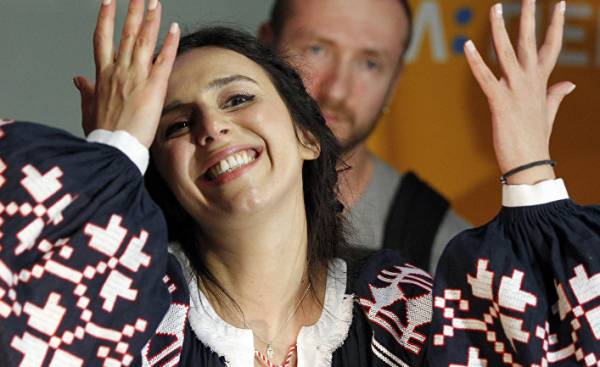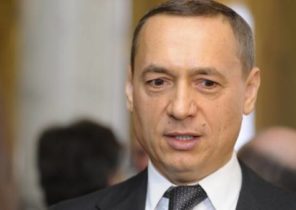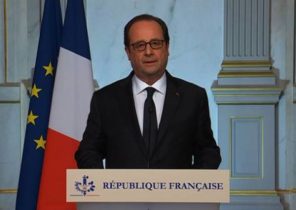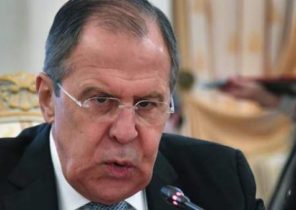
Does the voting at the Eurovision song contest at least some relation to the music? Many complain that some of the participants of voting — for example, residents of the Scandinavian countries and the Balkans — just vote for each other and the resulting scores are not an indicator of quality performance.
In this issue the people of the United Kingdom have a very tough position: a survey conducted in 2013, the company YouGov, showed that the British strongly believe that this contest was purely political, and for this reason in 2008, Terry Wogan (Terry Wogan) refused to comment on this show, saying that it has ceased to be a contest of musical talent.
Our artists often talk about political bias to reassure themselves and others, as otherwise they will look just losers. In 2013 Bonnie Tyler (Bonnie Tyler) called the vote results “incredible” after she took 19th place out of 26, and two years earlier, Simon Webb (Simon Webbe) noted that “it often happens that is important, not the songs themselves, but who are your neighbors.”
It is fair to say that the competition, where artists like the group Scooch or Spanish Chikilicuatre Rodolfo (Rodolfo Chikilicuatre) actually get any points, is not exclusively musical.
But if it can be called purely political? We will try to figure this out.
As a country vote?
Our interactive chart shows how the participating countries of “Eurovision” — is divided into eight regions that generally vote in accordance with the geopolitical lines.
It shows the average scores that each country received in the years of participation from other countries and 10 major sources of points and recipient points on each of the countries.
The maximum score that each country can award is 12 points, so any score above eight means that the receiving country is really benefiting from the voting in other countries.
How does this voting system?
In each country-the participant of “Eurovision” held a vote of the professional jury and the popular vote. You then distribute the points and compiled a list of the 10 most favourite songs: the first song on this list gets 12 points, second 10, third 8, then seven, six and so on.
In 2016, the Declaration order of points was changed so that the name of the winner remained unknown until the moment when all countries will announce the results of their voting. However, despite the confusion in the preparation and conduct of the contest, the system itself has not changed.
As we analyzed the results of the voting?
We put all the scores given by each country to other countries from 1994 to 2016 to find out who are our true friends on the continent. We also added the results of Australia, which in 2017 for the third time to take part in this competition.
Music contest “Eurovision” was founded in 1956 to unite European countries after the devastating Second world war, however, the results of the polls show that he has managed to unite some countries more than others.
Although in this case we are not talking about some warring blocs in the spirit of “Game of thrones”, certain groups of countries tend to award each other for higher scores, so they can be called “electoral blocs”.
Let’s take an example, consider Belarus. Belarus, sometimes called the “last dictatorship in Europe”, gained independence from the Soviet Union only in 1990.
Since then it has awarded two times more points than any other country, and nearly a third of the points awarded by Belarus at the contest, accounted for Russia and Ukraine. If this is not enough, remember that the voting system of the Eurovision forces each member country to distribute points among the 10 most liked performers.
Or consider the relations of Cyprus and Greece. Terry Wogan even emphasized this point exchange, saying it was “ridiculous. But they do it anyway. They just don’t care.”
It is worth noting that over the years, Cyprus has awarded almost three times more points to Greece than Russia, which ranks second in the list of preferences of the Cypriots. But Greece responded by giving Cyprus two times more points than any other country-the participant of “Eurovision”.
Over the past 10 years, the average score that was awarded to Greece to Cyprus, was 11.3 out of a possible 12. The average score, to which Cyprus replied Greece, at 10.4.
The main blocks
Although the exact parameters of these voting blocks can slightly vary depending on the particular study, we can identify the following blocks:
• The Balkans: States of the former Yugoslavia as well as Romania and Albania.
• Former Soviet Union and its satellites in Eastern Europe.
• Scandinavia: these include major Scandinavian fucking and also Iceland, Lithuania, Denmark and Latvia. Could ABBA to hope for such success, if it is not supported by Finland and Norway?
Always do countries vote for their neighbors?
Most of the “electoral blocs” based on the proximity of countries, but it is not the only factor. For example, the United Kingdom and Ireland often exchange high points with Malta. Ireland and Malta were two of the three countries that awarded points Electro Velvet in 2015. This can be considered a rather unusual unit.
The block boundaries are not rigid, and in some other research analysts have drawn them a bit differently. For example, the authors of the study 2014 carried out by University College London and Imperial College, United United Kingdom, Ireland and Scandinavia with the countries of the former USSR, the result of which was one giant block, which every year falls into two more or less random groups.
In their study, 2008 Dr. Derek Gatherer (Derek Gatherer) have identified six countries that still have not joined any one block: Monaco, France, Israel, Switzerland, Portugal and Germany.
Whether you want to be part of a unit to win?
If the country is part of the unit, it does not guarantee its success at “Eurovision”. For example, despite the fact that Norway has the Scandinavian block, it still remains the most unlucky participant of Eurovision: she came last 11 times, and four times she finished the contest with zero result.
Are there any blocks inside of cases of negative vote?
Although obvious to many, which usually countries have a positive vote for their neighbours, this does not mean that other European countries are experiencing active discrimination. Analysts from University College London and Imperial College found that no country systematically does not award another country low scores.
However, there are many examples to the contrary. In 2014, Armenia (which ranked fourth) came in last by a popular vote of Azerbaijan on the vote of the professional jury. The Armenian audience and the jury responded to Azerbaijan in the same coin, although in fairness it should be noted that the performance of Azerbaijani musicians was quite weak (22 out of 26 possible). It has been suggested that the cause was a strained relationship that resulted from the Nagorno-Karabakh war ended in 1994. In 2015, the scores were about the same, and both had received the minimum scores from other participants.
What is the impact of the policy?
In some cases, geopolitical bias is pretty hard to ignore. In 2015 “Eurovision” was held in the afternoon, when Ireland held a vote on whether to legalize same-sex marriages, which significantly influenced the chances of Russia — with its generally negative attitude towards gays to the success. Despite the fact that Russia regularly received pretty high scores on “game of thrones” (seven times fall in the top three for the last 15 years), many feared that the Russian party will meet Polina Gagarina cold in the arena, even established a special apparatus for active sound suppression in the event of catcalls.
However, despite voting blocs, Russia took second place with a rather small gap from the winner, Swedish singer Mons of Summerlea (Måns Zelmerlöw), who celebrated their victory, saying: “We are all heroes, regardless of who we love.”
William Lee Adams (William Lee Adams), the founder of Eurovision Wiwibloggs, suggested that the Russian government can come to the contest without the songs, and she will still manage to reach the final” — with the votes of the loyal neighbors from the former Soviet Union.
In 2017 we will check the validity of this theory, because Russia will not participate in Eurovision: Ukrainian authorities have deprived her of her right to participate in the competition, because the Russian singer previously performed on the territory of Crimea.
In fact, last year Ukraine’s victory at Eurovision, according to many analysts, was the result of a political resonance which has caused the song of the Ukrainian contestants. Her song was dedicated to the deportation of the Crimean Tatars under the regime of Joseph Stalin — a considered selection of a theme with a transparent hint that Russia is now doing this region. Russia tried to ban this song in 2016, but failed. Victory of Ukraine in many was the result of policy.
Bosnia and Herzegovina
Let’s look at the scores of Bosnia and Herzegovina. At that time, with which we begin our calculations, the country was involved in a war between Serbian, Croatian and Muslim ethnic groups.
Today, the same separation lines are visible in the results of the vote. Turkey and Croatia took first and second place in her list of preferences, and Serbia fourth. This suggests that different groups of the population still vote for a different country.
Meanwhile, the consistently high scores that Germany Turkey awards, indicate the amount of the Turkish population in this country.
Other factors
There are other explanations. Famous performers tend to receive higher scores, and for this they need to be popular in countries neighbouring their country. Maria Serifovic (Marija Šerifović), which won the contest for Serbia in 2007, five years have released albums and performed concerts before invited her to Eurovision. Her performances at festivals and other events in Serbia, Montenegro and Croatia gained her a lot of fans in these countries and thus to obtain higher scores on Eurovision.
This trend is typical for Western Europe. For example, the United Kingdom was awarded Jedward maximum or near maximum scores for two consecutive years. Perhaps this explains the fact that the great British public get to know these performers when they took part in the X Factor at the peak of popularity of this show.
When the United Kingdom tried to apply this tactics, organizing a European tour for the singer jade Ewen’s (Jade Ewen) in 2009, it worked again, and even took the fifth place, which was a significant improvement in the position compared to the previous year.
Officials of the Eurovision usually are struggling to ascribe to the tendency to vote along geographic lines tastes and preferences. Often in neighbouring countries the overall media landscape, language and music preferences. However, many still believe that in some cases the voting results do not reflect the quality of songs and performance.
Have the United Kingdom, any problem?
The success of the United Kingdom at the Eurovision song contest cannot be called impressive. Over the past 13 years we’ve gone to the latter, and only two of our party over the last 15 years of top ten hits. Duo Electro Velvet took a disappointing 24 out of 27 possible in 2015, and in 2016 the setback suffered Joe and Jake.
However, countries that are not part of any of the major blocks shown some good results. Germany, which is not included in main blocks, won in 2010 when the young singer Lena received high marks from two thirds of the participating countries. Although it is worth noting that in 2015, Germany came last, when Anne Sophie (Sophie Ann) did not receive any points.
Whilst the United Kingdom quite often gives preference to Eastern Europe, it is also repeatedly taken advantage of biased voting. In 2007, Malta was awarded the maximum number of points completely incompetent group Scooch.
On the other hand, Australia — new participant of “Eurovision”, located thousands of miles from Europe and is not part of the main blocks — not put our party any points in 2015, pointing out that perhaps policy is not the only obstacle in our way to success.
Whatever consolation may seem to us the idea that bloc voting is the main reason for the failure of the United Kingdom at Eurovision, yet this is not the only reason.







